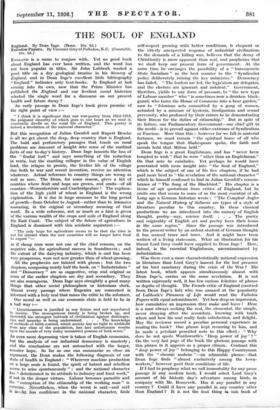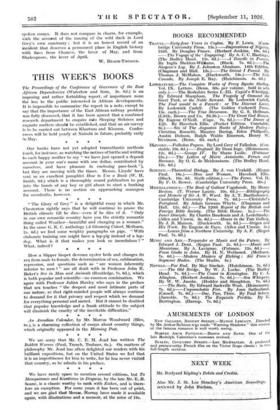THE SOUL OF ENGLAND
England. By Dean Inge. (Bann. las. 6d.)
ENGLAND is a, name to conjure with. Yet no good book about England has ever been written, and the word has not been popular in titles. Sir John Lubbock wasted a good title on a dry geological treatise in his Scenery • of England, and in Dean Inge's excellent little bibliography "England " indicates only text-books. Is England at last coming into its own, now that the Prime Minister has published On England and our liveliest social historian
selected the single word for a discourse on our present health and future decay ?
An early passage in Dean Inge's book gives promise of the right point of view :-
" I think it is significant that our war-poetry from 1914-1919, the poignant sincerity of which goes to our heart as we read it, constantly dwells on the rural life of England. This poetry is indeed a revelation of the national character."
But this recognition of Julian Grenfell and Rupert Brooke is all we get about the deep, deep country that is England. The bald and perfunctory passages that touch on rural problems are innocent of insight into some of the cardinal facts of our to-day's history. Dean Inge laments the loss of
the " feudal lord " and says something of the reduction in rents, but the startling collapse in the value of English
land, the relapse to prairie, the livelier life of the village due both to war and recent invention, receive no attention whatever. Actual reference to country things are wrong as well as rare. The Dean, for some reason, gives a list of counties where fruit and hops are grown, and omits—of all counties—Worcestershire and Cambridgeshire I The explana- tion of the high yield of wheat in England is the wrong explanation. It is due in large measure to the long period of growth—from October to August—rather than to intensive manuring, in the original or secondary meaning of that word. In a wide reference, not so much as a hint is given of the various wealth of the crops and soils of England along the East Coast. The subject of the future of agriculture in England is dismissed with this sciolistie aspiration :-
" The only hope for agriculture seems to be that the time is not far distant when the new countries will no longer have food to export "- as if cheap corn were not one of the chief reasons, on the
negative side, for agricultural success in Scandinavia ; and the extent of the dairying industry, which is and has been very prosperous, were not now greater than of wheat-growing. All the prophecies are tainted with gloom ; but the two chapters, composing nearly half the book, on " Industrialism " and " Democracy " are as suggestive, crisp and original as some of the earlier chapters are dry and secondary. They are also courageous. Dean Inge says straightly a good many things that other social philosophers or historians shirk. Almost every passage where Eugenics are concerned is informed with a holy zeal that raises the critic to the reformer.
Our moral as well as our economic state is held to be in bad way :—
" Licentiousness is justified in our fiction and not reprobated in society. The monogamous family is being broken up, and therewith the strongest bulwark of civilization against disintegra- tion and anarchy is being undermined. . . . The knowledge of methods of birth-control, which society has no right to withhold from any class of the population, has had unfortunate results upon the morals of very many unmarried persons of both sexes."
An even more depressing view is taken of English economics, but the analysis of our industrial democracy is masterly ; and the conclusions are not untouched with the larger, remoter hope. So far as one can summarize so close an argument, the Dean makes the following diagnosis of our state of health in England : " Wherever machine production on a large scale is found, the spirit of hatred and rebellion seems to arise spontaneously " ; and the national character has " deteriorated in its attitude to industry and hard work," if not in the deeper virtues. Labour becomes parasitic and the " corruption of the citizenship of the working man " is extreme. Nevertheless, when the worst is said—and said it ia—lt3 has confidence in the national character, finds self-respect growing with better conditions, is eloquent or the utterly unexpected response of industrial civilizations to the demands of a killing war, believes that the decay of Christianity is more apparent than real, and prophesies that we shall keep our present form of government. At the same time he envisages the possibility of a " bureaucratic State Socialism " as the best counter to the " Syndicalist policy deliberately ruining the key industries." Democracy has failed. " The leaders are led, the legislators are delegates, and the electors are ignorant and indolent." Government, therefore, yields to any form of pressure, to " the new type of Labour member" who " is sometimes now a drunken black- guard, who turns the House of Commons into a bear garden," now to " felonious acts committed by a gang of women, actuated by a mixture of hysteria, hooliganism and sexual perversity, who professed by their crimes to be demonstrating their fitness for the duties of citizenship." But in spite of its failure, our Parliamentary Government—our chief gift to the world—is to prevail against either extremes of Syndicalism or Fascism. More than this : however far we fall in material fortunes, we must remain " the spiritual home of all who speak the tongue that Shakespeare spoke, the faith and morals hold that Milton held."
Dean Inge is a great Englishman, and has " never been tempted to wish " that he were " other than an Englishman." On that note he concludes. Yet perhaps he would have penetrated with more insight into " the Soul of England," which is the subject of one of his five chapters, if he had paid more heed to " the revelation of the national character " which he himself confessed to find in Julian Grenfell's remem- brance of " The Song of the Blackbird." His chapter is a tissue of apt quotations from critics of England, but he omits one that seems to some of us the most essential of all. Long ago a German historian wrote : " The Compkat Angler and the Natural History of Selborne are types of a style of literature peculiar to this country. In these classical productions we are introduced into the nursery of English thought, poetry—nay, science itself. . . . The purity and originality of English art and poetry have their home in the same region." Since the passage was introduced to the present writer by an ardent student of German thought it has seemed truer and truer. And it might have been written of a living statesman. What an illustration for his thrust Lord Grey could have supplied to Dean Inge ! Here, indeed, is the essential Englishman, uncontaminated by industrialism.
Was there ever a more characteristically national expression in literature than Lord Grey's lament for the lost presence of his bird sanctuary during the crisis of the War ? His latest book, which appears simultaneously almost with Dean Inge's, carries on the same revelation. It is not written supremely well, it has few curious felicities of phrase or depths of thought. The French critic of England (omitted from Dean Inge's list) who was amazed at the popularity of Lubbock's Pleasures of Life would read the Fallodon Papers with equal astonishment. Yet how deep an impression, how cumulative an impression they make and leave Here is a man always seeking the real, the elemental, the simple, never straying after the secondary, knowing with truth where and how his soul really finds satisfaction, and delight. May the reviewer record a peculiar personal experience in reading the book? One phrase kept recurring to him, and he made a petulant pencilled note to this effect : " Why does he not quote Wordsworth's ' Deep power of joy' ? " On the very last page of the book the glorious passage with this phrase in it appears as a proper climax. Contrast this " deep power of joy " belonging to this Happy Countryman with the " chronic malaise "—an admirable phrase—that Dean Inge finds " almost exclusively among the town- workers," however good their conditions of life.
If I had to prophesy what we call immortality for any prose passage in any modern book, I would select Lord Grey's account of his historic day's adventure among birds, in company with Mr. Roosevelt. Has it any parallel in any country ? Could it have any parallel in any country other than England ? It is not the best thing in tills book of
spoken essays. It does not compare in charm, for example, with the account of the taming of the wild duck in Lord Grey's own sanctuary ; but it is an honest record of an incident that deserves a permanent place in English history With lines from Chaucer, the lover of May, and from Shakespeare, the lover of April.
W. BEA CH -T 110.MAS.,







































 Previous page
Previous page